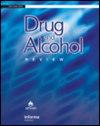Mutual-Support Groups for Alcohol and Other Drug Use in East, South and Southeast Asia: A Scoping Review
Abstract
Issues
Given the growing need to understand mutual-support groups for alcohol and other drug (AOD) recovery across diverse cultural contexts, it is essential to comprehensively examine these groups in East, South and Southeast Asia, including strategies to enhance their cultural appropriateness and their effectiveness.
Approach
Searches were conducted in Cinahl, EMBASE, MEDLINE, PsycINFO, PubMed, Scopus and Web of Science until November 2021. Original studies in peer-reviewed journals of any language and design that examined mutual-support groups for AOD use in these regions were included.
Key Findings
Forty-six studies were identified from 1612 de-duplicated records, predominantly from Japan (34.8%) and Iran (32.6%), with none from Southeast Asia. Most were cross-sectional (47.8%) and examined 12-step groups (76.1%). Culture-oriented adaptation strategies (values, beliefs, traditions) were most reported, with religion/spirituality most employed and friends/family involvement often proposed as important. Across all employed strategies, the use of community spaces (e.g., community centres, places of worship) was most common. Preliminary evidence suggests that strategies, especially those addressing nuanced sociocultural factors, correlate with positive AOD recovery outcomes.
Implications
Findings reveal culture-, language- and community-oriented strategies that can be utilised to meet the cultural needs of target populations. Mutual-support group membership is associated with positive outcomes.
Conclusion
Strategies to enhance cultural appropriateness of mutual-support groups in East and South Asia were identified. Evidence on the effectiveness of mutual-support groups, particularly in Southeast Asia, remains limited. Future investigation can elucidate potential differences in effectiveness between types and extents of strategies used to enhance cultural appropriateness of mutual-support groups in these regions.


 求助内容:
求助内容: 应助结果提醒方式:
应助结果提醒方式:


